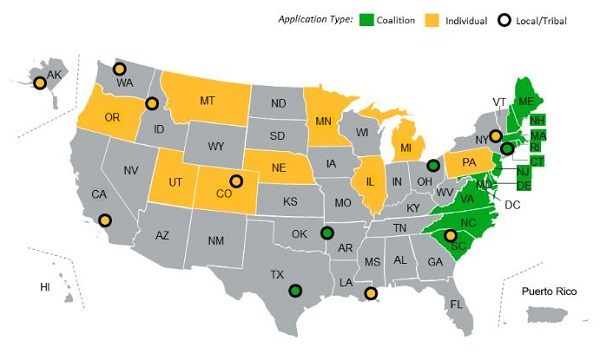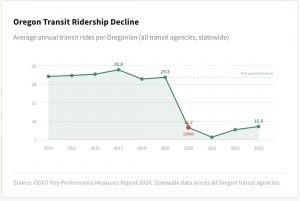Oregon DEQ wins $197 million grant to tackle the climate crisis
6 min read
|
Getting your Trinity Audio player ready...
|
from the U.S. Environmental Protection Agency, Oregon Gov. Tina Kotek, and staff reports
Oregon’s Department of Environmental Quality was awarded a $197,181,796 climate pollution reduction grant July 22, about four times the amount awarded any other Northwest state.
Oregon is among 25 selected applications to receive $4.3 billion in funding to implement community-driven solutions that tackle the climate crisis, reduce air pollution, advance environmental justice, and accelerate America’s clean energy transition.
Oregon’s “Climate Equity and Resilience Through Action (CERTA)” grant expects to reduce GHG by the equivalent of 6.6 million metric tons CO2 across multiple sectors from 2025‑2050. Programs will include (a) heavy-duty and light-duty electric vehicles and charging rebates, (b) incentives for building decarbonization and smart development, (c) programs to reduce food waste, and (d) programs to reduce methane from landfills. Together these activities align with the state’s goals of creating sustainable and transformative approaches to tackling the climate crisis.
“Gov. Kotek and our state agencies have demonstrated outstanding leadership in securing this highly competitive federal grant,” said Meredith Connolly, director of policy and strategy for Climate Solutions. “This level of funding will enable investments in every corner of Oregon, making clean energy solutions more affordable, our air cleaner, and our economy greener. By transitioning to electric cars, buses, trucks, and heat pumps – all powered by renewable energy – we are also increasing our communities’ long-term resilience in the face of rising wildfire threats and extreme heat. Our organization along with many others stand ready to support the state’s implementation to ensure a swift reduction of climate pollution, with a strong focus on benefiting frontline communities and lower-income Oregonians across the state.”
“Reducing greenhouse gas (GHG) emissions is a critical strategy to mitigate the impacts of climate change,” said Oregon Gov. Tina Kotek. “When I was Speaker of the House, I fought for ambitious GHG reduction goals. This investment is not only an affirmation of Oregon’s collective efforts to combat climate change, but a significant down payment on our ability to meet our reduction goals with a statewide approach. I want to thank Oregon’s congressional delegation for their partnership in making this key investment happen.”
“Tackling the climate crisis is a team effort, and we need bold investments that put our communities first,” said Rep. Val Hoyle. “Thanks to the Inflation Reduction Act, $197 million is headed to Oregon to help us reach our carbon emissions targets, bringing us a step closer to cleaner air and a healthier climate.”
“After advocating for this funding alongside my Oregon colleagues,” said Rep. Andrea Salinas, “I am proud to announce that the state of Oregon will be receiving $197 million from the EPA to help reduce pollution and greenhouse gas emissions in our communities. Climate change poses an existential threat to our health, safety, and way of life here in Oregon – from growers who are dealing with worsening wildfires and extreme weather, to Tribal communities whose access to salmon and other traditional foods is under threat. This grant will ensure that we continue to make progress in the fight against climate change and deliver a cleaner, greener future for our children and grandchildren.”
“Congress passed the Inflation Reduction Act with the recognition that we must invest to fight the climate crisis,” said Rep. Suzanne Bonamici. “I’m grateful to have helped Oregon secure this significant funding to reduce carbon pollution and help the transition to clean energy. This innovative work is important to all Oregonians and Americans, but especially meaningful for the underserved communities that have borne the greatest burden of pollution. The time to act on climate is now, and this funding will make action possible.”
“As climate chaos intensifies, we must act boldly and quickly to transition to clean and renewable energies,” said Sen. Jeff Merkley. “This major federal funding from the Inflation Reduction Act will give Oregon more tools in the toolbox to meet the state’s climate goals. This includes reducing harmful emissions in our transportation, construction, and other sectors that will lead to better health for our communities and less pollution in our environment.”
“It’s as clear as Crater Lake that clean, renewable energy and smart decarbonization strategies are vital ingredients for a healthy, prosperous country,” said Sen. Ron Wyden. “These shrewd federal investments will move the country forward technologically while bolstering local economies and improving environmental and human health.”
“Every community is feeling the impacts of climate change, from heat waves and drought conditions to increased wildfire smoke and severe winter storms. We must act collaboratively to reduce carbon emissions and to address the adverse impacts on people’s health and our economic prosperity,” said EPA Regional Administrator Casey Sixkiller. “Through the Biden Administration’s Inflation Reduction Act, EPA is partnering with states and local communities to make the largest investments ever in green buildings, clean energy transportation, and climate justice, and the Pacific Northwest continues to lead the way.”
EPA made its selections through a rigorous grant competition, reviewing nearly 300 applications to ensure the competition was fair and impartial. Applications were submitted by entities from across the country and requested a total of nearly $33 billion in funding.
The 25 selected applications – from states, a Tribe, local governments, and coalitions of these entities – will receive federal funding to implement local and regional solutions. Many of these projects can be expanded and provide examples and blueprints that other states, local governments, Tribes, and even businesses can replicate in their work to tackle the climate crisis.
For example, here in the Northwest, the Nez Perce Tribe received $37.35 million to fund residential energy efficiency and weatherization retrofits, wood stove replacements, renewable energy infrastructure, and electric vehicle transportation networks on the Tribe’s facilities in Idaho and Oregon.
King County, Washington was awarded $50 million for a four-county project, “Accelerating Equitable Building Decarbonization Throughout the Building Lifecycle,” to reduce operational emissions from existing multifamily and small commercial buildings across King, Kitsap, Pierce, and Snohomish counties. The project will help reduce embodied carbon emissions in new building construction and the creation of systems to reuse wood at the end of a building’s life to avoid emissions.
Montana’s Department of Natural Resources and Conservation received $49.77 million, for an estimated reduction of 15.0 MMT by 2050. The “Forest, Community and Working Landscapes Climate Resiliency Project” will improve forest management and expand urban and community forests. The selected application will also assist efforts to mitigate wildfires and coal seam fires and support local initiatives to improve soil health and reduce pollution from agriculture.
Alaska’s Southeast Conference was awarded $38.6 million. The “Accelerating Clean Energy Savings in Alaska’s Coastal Communities” grant will provide advisory services and incentives to replace residential oil burning systems with energy-efficient heat pumps in 6,100 buildings throughout the region’s 50 communities, eliminating approximately 3.3 million gallons of heating oil and providing household savings of 25–50% on heating bills.
The 25 selected projects will implement ambitious climate pollution reduction measures designed by states, Tribes and local governments that will achieve significant cumulative GHG reductions by 2030 and beyond. Together, these grants are estimated to reduce greenhouse gas pollution by as much as 148 million metric tons by 2030 and by 971 million metric tons by 2050, based on estimates provided by the selected applicants.
EPA expects to announce up to an additional $300 million in selections under the Climate Pollution Reduction Grants program for Tribes, Tribal consortia, and territories in the coming weeks.
The grants will fund projects supporting the deployment of technologies and programs to reduce greenhouse gases and other harmful pollution across the country and build the infrastructure, housing, industry, and competitive economy needed for a clean energy future. These grants will also help businesses capitalize on new opportunities, spur economic growth and job creation by supporting new and growing industries, and support development of training programs to prepare workers. EPA expects to award the funds later this year, once all legal and administrative requirements are satisfied.
Oregon will use this federal grant to implement the measures identified in Oregon’s Priority Climate Action Plan. The prioritized measures fall into three categories that are among the largest contributors to Oregon’s GHG emissions: transportation, residential and commercial buildings, and the handling of waste and materials.
The workplan lays out 12 critical measures that will accelerate Oregon’s emission reduction efforts for a vibrant environment, for the health of communities across the state, and for a more sustainable future:
- Measure 1: Expand Oregon Clean Vehicle Rebate Program
- Measure 2: Light duty electric vehicle charging: Community Charging Rebates
- Measure 3: Medium- and Heavy-Duty Vehicle Rebate Program
- Measure 4: Medium and Heavy-Duty Diesel Emissions Mitigation Grant Program
- Measure 5: Medium-and Heavy-Duty Charging Infrastructure Grant
- Measure 6: Incentives for Building More Energy Efficient Housing
- Measure 7: Commercial Building Performance Standards Incentives
- Measure 8: Heat Pump Incentives
- Measure 9: Residential Weatherization
- Measure 10: Building reuse and space-efficient housing
- Measure 11: Food waste infrastructure
- Measure 12: Landfill methane controls
For more information, read Oregon’s Climate Pollution Reduction Implementation Grant Workplan Narrative.






